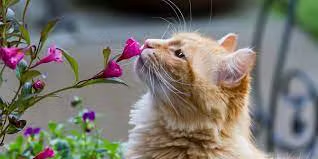Cats and Their Remarkable Sense of Smell

Features Editor: Ravi Teja Mandapaka
Did you know a cat's sense of smell is approximately 14 times more powerful than a human's? This remarkable olfactory capability is due to the cat's proportionally larger nasal organ, making their nose their most critical sensory tool.
Survival Through Smell:
A cat's life heavily relies on its sense of smell for various survival aspects. They employ their remarkable olfactory abilities for:
1. Finding Food: A kitten, blind at birth, relies on its sense of smell to locate its mother and find nourishment. Throughout their lives, cats use their keen noses to track down food, sometimes even in unexpected places.
2. Seeking Mates: Female cats in heat emit a potent sex pheromone that can be detected by males from a mile away. This plays a vital role in their reproductive behavior.
3. Marking Territories: Male cats mark their territories with urine or pheromones from glands in their face and paws. They revisit these markings, sniffing to assess the status of their environment, and reapply scent markings as needed.
4. Detecting Danger: When a cat ventures outside, you might notice it enters with a poised stance, twitching whiskers, and flaring nostrils. In this vigilant mode, cats are not only alert to potential threats but also collect information about recent visitors and their activities.
Jacobson's Organ and the Flehmen Response:
Cats, along with other mammals, have a unique organ called Jacobson's organ, located in the nasal septum above the mouth's roof, which connects to the nasal cavity. Cats can open ducts to this organ by wrinkling and lifting their lips, a behavior known as the Flehmen response. Jacobson's organ significantly enhances a cat's sense of smell, regardless of size or species.
Feline Nose Leather:
A cat's nose leather can be either black or pink, depending on genetics and coat color. While it appears rigid, it's a living tissue susceptible to diseases. Light-colored or white cats are especially prone to squamous cancer in the nose and ear areas, often caused by prolonged sun exposure. To protect your cat, consider veterinarian-approved sunscreens for these delicate areas.
Cats' incredible sense of smell is an essential part of their daily lives, helping them navigate the world and ensure their survival.
______________________________________________
About Author
Ravi Teja Mandapaka is a multifaceted scholar, poet, and passionate advocate for animals. From English literature to agricultural sciences, from field hockey to music and the arts, Ravi's diverse interests converge in his unwavering commitment to animal welfare. He believes in a journey where compassion meets creativity, and academia blends with advocacy.
 https://www.linkedin.com/in/ravimandapaka/
https://www.linkedin.com/in/ravimandapaka/


